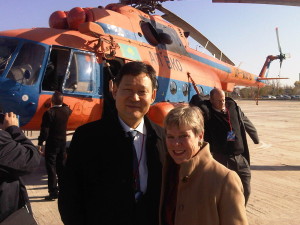Kazakhstan and Russia: Too Close for Comfort
 Kazakhstan seems to be using a very Russian approach to deal with internal turmoil. Could Russia potentially transform the former member of the Soviet bloc into a modern 21st century satellite? And most importantly do these similarities mark the official establishment of a modern sphere of Russian influence?
Kazakhstan seems to be using a very Russian approach to deal with internal turmoil. Could Russia potentially transform the former member of the Soviet bloc into a modern 21st century satellite? And most importantly do these similarities mark the official establishment of a modern sphere of Russian influence?
Kazakhstan is a former Soviet nation led by President Nusultan Nazabayev, who has held the position since 1991 - the year of Kazakh independence from the Soviet Union. The president’s close relations with Russia as well as the country’s influential Russian minority have significantly affected internal political approaches, mostly to the disadvantage of the population at large. Most recently, nonviolent protests have been shut down with the excuse that such protests could easily get out of hand and lead to Ukrainian-like civil turmoil. These restrictions make for a cloying “peace” in Kazakhstan, a façade plastered over a country overrun with ethnic disagreements.
Clashes between Kazakhstan’s over 140 ethnic minorities come as no surprise, but the excessive efforts of the Kazakh government to block the nature of these clashes from the general public, has struck many external actors as suspect.
Just yesterday, Southern Kazakhstan was shaken by the news of ethnic tumult that resulted in the murder of a Kazakh villager at the hands of his Tajik neighbor. Disagreements between the two groups have produced an undeniable sense of uneasiness throughout the region, which has inevitably spread throughout the country. Reports on the event have been censored and only those providing a very general, non-ethnically oriented perspective, have been made available to the general public. Such a restrictive approach to news, in an era when journalists pride themselves on honesty and transparency, has gotten the rest of the world worried about the Kazakh future. A future possibly overrun by serious infringements on natural rights, including freedom of expression, speech, and a right to general knowledge.
On the other hand, the Kazakh government’s fears over internal unrest are not unfounded. Kazakhstan and Ukraine seem to be drawing an uncomfortably large amount of parallels in the last few years. Both countries harbor a large ethnic Russian minority: 17.3% of Ukrainians are considered ethnically Russian, while a whopping 21% of Kazakhstan’s population is ethnically Russian. The Ukrainian east is heavily “Russified” as is Kazakhstan’s northern region. President Nazabayev’s worries about Kazakhstan’s future in relation to Russia are valid but the manner in which he and his subordinates are approaching these incidents can be interpreted as being somewhat oppressive. Also it is important to note that the Ukrainian-like uprisings President Nazabayev fears were pro-Western and revolted against Russian presence in the country. Aversion towards pro-European protests again demonstrates Russian influence seeping into Kazakhstan’s internal politics.
To recap, the main worry from the Western perspective is Kazakhstan’s willingness to resort to measures that limit the population’s freedom of speech in relation to its Russia’s similar efforts to suppress pro-European movements in Ukraine. On the other hand, Kazakhstan’s president is attempting to keep peace within his country through the implementation of the above-mentioned measures as well as glossing over the ethnic nature of civil conflicts. Although his reaction is understandable, the approach President Nazabayev adopts does not fit in with the liberal ideology of a government’s duty to respect the population’s natural rights.
